Material testing machines up to 2.5 kN
The universal testing machine inspekt solo is a very lightweight testing machine, which has been designed for simple standard tests or customer-specific, more challenging tests…
At Hegewald & Peschke, they offer a wide range of universal testing machines that deliver accurate and reliable results. Their machines are equipped with advanced features and cutting-edge technology to perform a variety of tests, including tension, compression, bending, shear and more. With customizable options and a wide range of load capacities, their universal testing machines are suitable for different sample sizes and testing requirements.
When testing materials, precision and consistency are crucial. Therefore, universal testing machines from H&P are built to the highest quality standards and undergo stringent calibration and quality control measures. Their goal is to provide you with accurate, repeatable and traceable test results so you can make informed decisions about material selection, quality control and product development.
On this page, you can see all about their range of universal testing machines and find out how they can help you perform accurate and comprehensive material testing. With Hegewald & Peschke as your trusted partner, you can rely on the excellence and reliability of their universal testing machines to meet your testing needs and drive innovation in your industry
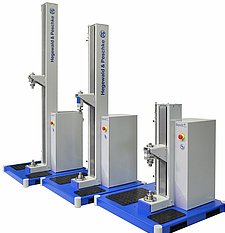
Material testing machines up to 2.5 kN
The universal testing machine inspekt solo is a very lightweight testing machine, which has been designed for simple standard tests or customer-specific, more challenging tests…
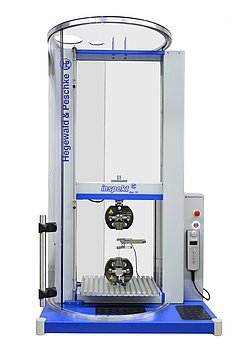
Material testing machines up to 10 kN
The inspekt duo is a versatile two-spindle tensile testing machine for test loads of 5 to 10 kN. It is a further development of the inspekt table blue series from Hegewald & Peschke.
The inspekt duo machine series is ergonomically designed. Characteristic features include the large base plate, which allows the connection of peripheral devices such as extensometers, as well as the coupling of a tool tray and the equipment with protective doors. This guarantees use in harsh production environments as well as in sterile laboratories. The LabMaster materials testing software is available for fast and reliable evaluation of test results.
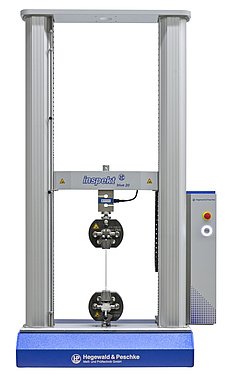
Material testing machines up to 30 kN
The inspekt blue material testing machines were designed for standard and routine tests. These universal testing machines are used, among other things, in quality assurance and are characterised by a particularly attractive price/performance ratio.
The inspekt blue is suitable for tensile tests, compression tests, peel tests and bending tests on various materials. In combination with the ergonomic design and the new brushless drive concept, a safe and fast measurement is guaranteed with simplest operation both in the rough production environment and in the sterile laboratory area.
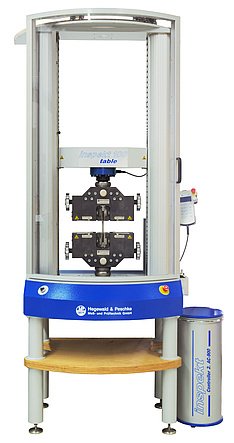
Material testing machines up to 250 kN
The testing machine series inspekt table was developed for standard-compliant materials and component testing in the medium load range, with particular attention paid to reliability and flexibility.
It is ideally suited for materials testing of plastics or non-ferrous metals as well as for testing smaller components, for example from instrument engineering. Inspekt table is available in six different load levels from 5 kN to 250 kN. On request, the testing machines of the inspekt table series can be equipped with a second test area. They are available as floor-standing or table-top versions, depending on the requirements of the workplace.
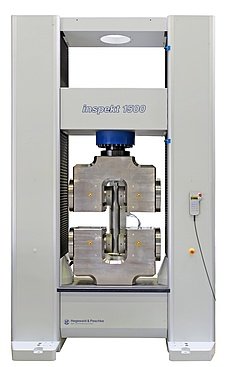
Material testing machines 100kN to 2500 kN
The series inspekt fulfils highest demands in terms of measurement accuracy and versatility. It allows tensile, compression, bending or torsion tests, flexibly adapted to customers test conditions. It is also characterised by its first-class frame stiffness, modern control electronics, and a convincing cost/performance ratio.
The size of the test rooms of the individual machines can be customized. It is also possible to add one or more test room. Thus, the top-quality, rugged machines can be used for almost any testing task at the best reliability and accuracy.
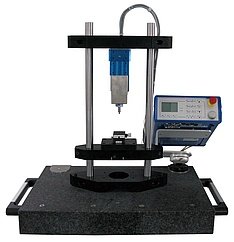
Material testing machines up to 500N
Static micro testing system with spindle drive for tensile testing, compression testing, peel testing and bending testing of micro components, as two-column testing system or testing system in C-frame construction…
Static material testing is a scientific method used to analyze the mechanical properties of materials under constant and slow-loading conditions until the material reaches failure or a specified limit. It involves applying a constant force or displacement to a material to measure its strength, stiffness, ductility, and other important mechanical characteristics.
Static material testing is crucial for understanding how materials behave under steady and predictable loads. It helps engineers and researchers to determine the performance and limitations of materials, ensuring the safe design and use of various products and structures.
Static material testing allows the evaluation of several mechanical properties, including tensile strength, compressive strength, yield strength, modulus of elasticity, hardness, elongation, fracture toughness, and creep resistance.
There are various types of static material tests, such as tensile testing, compression testing, flexural testing, hardness testing, shear testing, and creep testing. Each test is designed to evaluate specific mechanical properties of the material.
Static material testing involves securing the material sample to a testing machine and applying a load or displacement at a constant rate until failure or the desired limit is reached. During the test, data is collected and plotted on load-displacement or stress-strain curves to analyze the material’s behavior.
Static material testing finds applications in various industries, including aerospace, automotive, construction, manufacturing, and research. It is used to assess the quality of materials, validate design choices, conduct failure analysis, and ensure compliance with industry standards.
Test results from static material testing are typically presented in graphical format, showing stress-strain or load-displacement curves. Engineers analyze these curves to determine the material’s elastic and plastic behavior, ultimate strength, yield point, and other mechanical properties.
While static material testing provides valuable information about a material’s mechanical behavior, it may not fully replicate real-world scenarios involving dynamic or impact loading. Additional testing methods, such as dynamic testing or fatigue testing, may be necessary to simulate specific real-world conditions.
Static material testing does not account for the effects of time-dependent factors, temperature variations, or rapid loading conditions. Additionally, it may not fully capture the material’s behavior under complex stress states or at extreme strain rates.
Static material testing plays a critical role in material development and selection by providing essential data on mechanical properties. Engineers can use this data to choose the most suitable materials for specific applications, ensuring safety, reliability, and optimal performance of the end product.